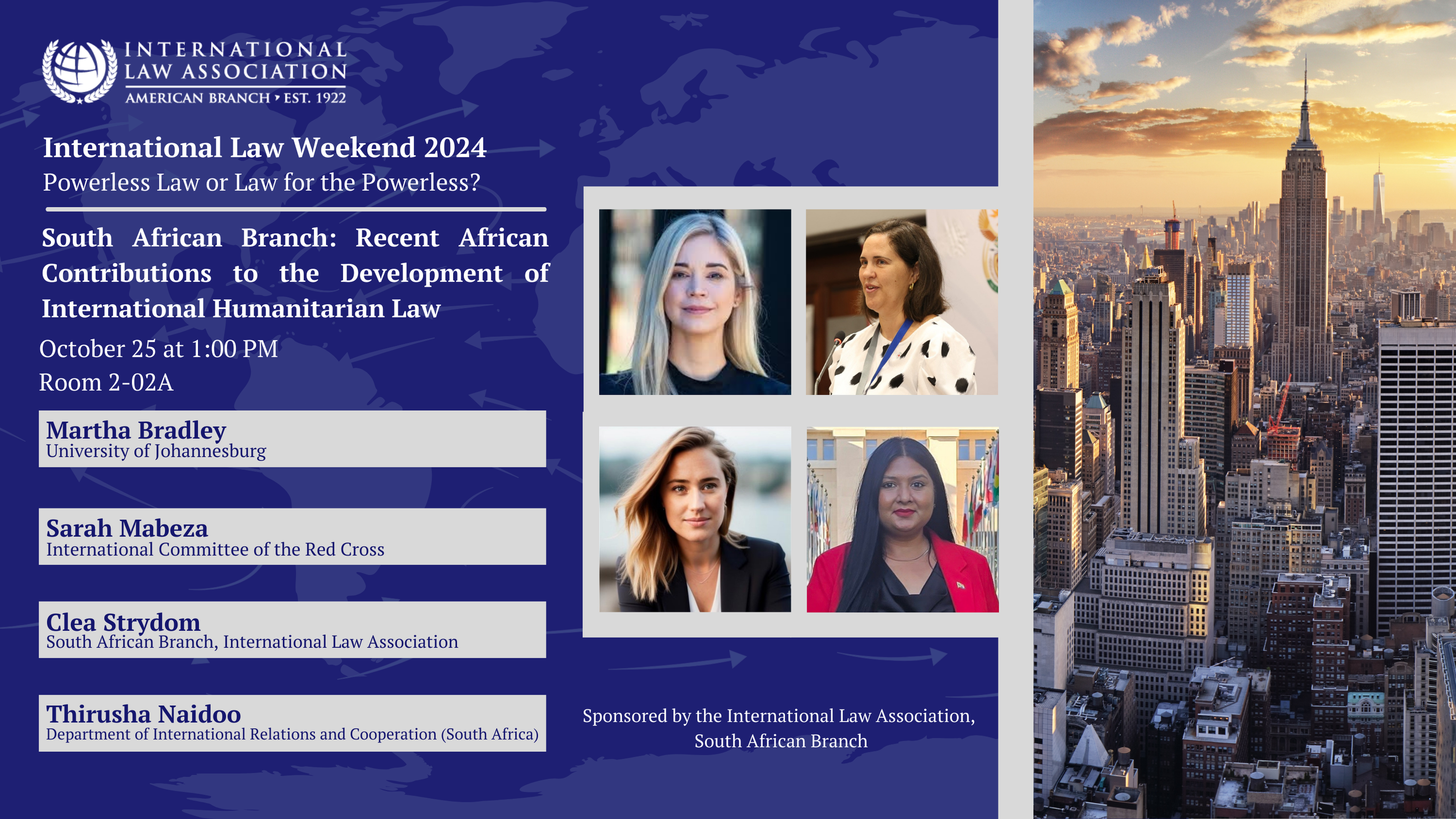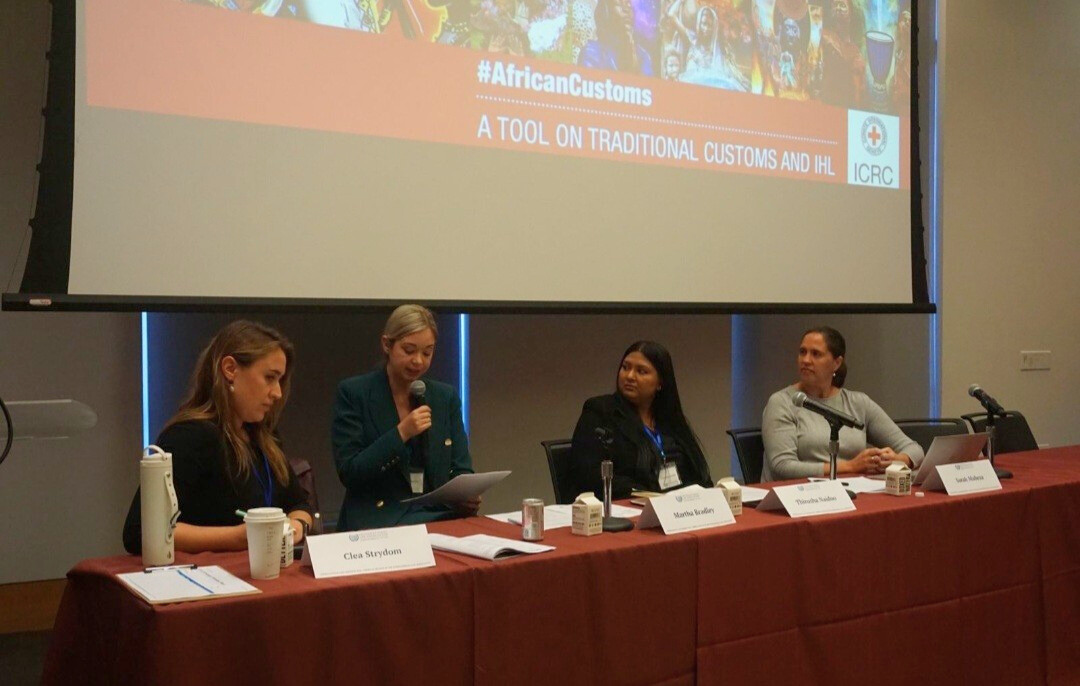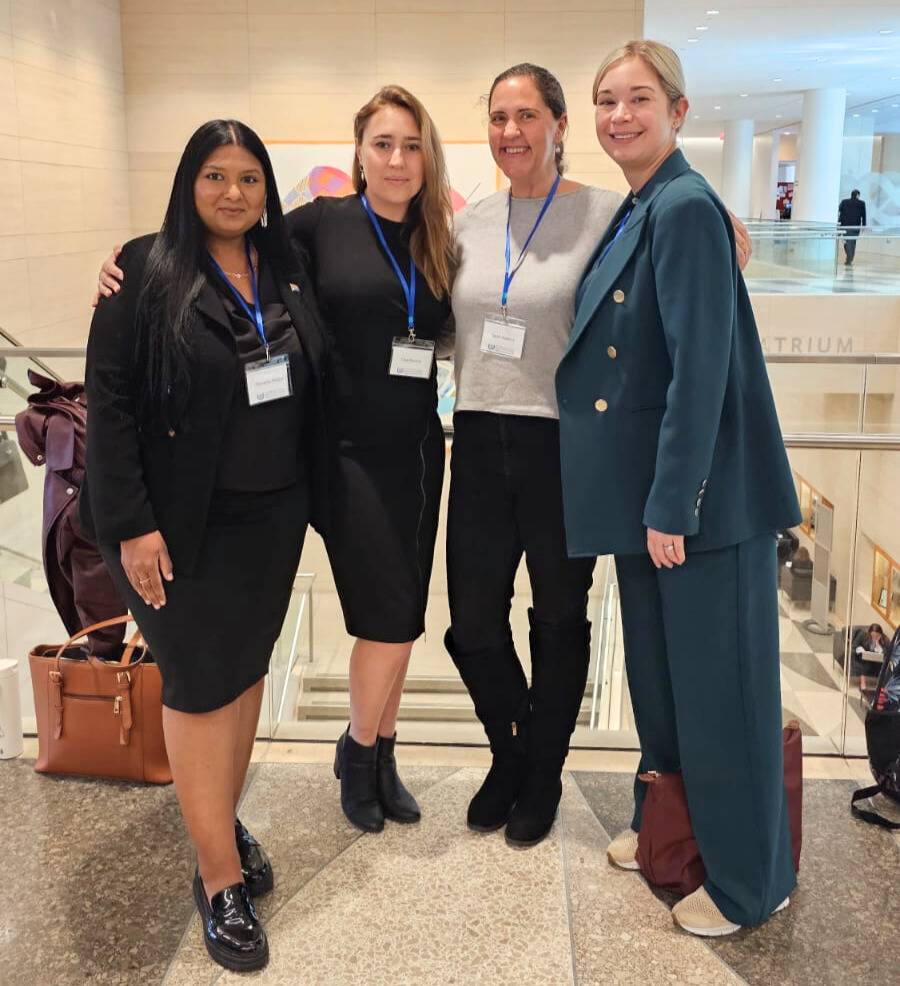ILW24 Reflection: South African Branch – Recent Contributions to the Development of International Humanitarian Law

by Thirusha Naidoo, State Law Adviser (International Law) at the Office of the Chief State Law Adviser, Department of International Relations and Cooperation (South Africa)
The International Law Weekend (ILW) 2024 began with intense excitement and expectancy from both speakers and participants, all of which were sparked by the collaborative and diverse program. Every panel organized was aimed at not only prevalent and pertinent topics but also several areas in the international law sphere, promising to leave its hearers filled with added knowledge that would expand the horizon of understanding and provoke critical thinking of international law, its power and its impact for the powerless, the question posed by ILW 2024.
The South African Branch of the International Law Association (SABILA) seized the opportunity to share South Africa’s contributions to International Humanitarian Law (IHL). Our team comprised three panelists from diverse backgrounds to provide a holistic coverage of South Africa’s contribution. Our panelists ranged from academia, an independent humanitarian organization, and government, namely, Professor Martha Bradley, Professor of Public Law, University of Johannesburg (UJ), Sarah Mabeza, Regional Legal Advisor, International Committee of the Red Cross (ICRC – Southern Africa Branch) and Thirusha Naidoo, State Law Adviser (International Law), South Africa’s Department of International Relations and Cooperation (DIRCO). The diversity and views of each panelist were resourcefully brought together and moderated by Sabila Secretary Clea Strydom. The team brought South Africa’s efforts and success in the IHL field to the forefront.
At present, many question the impact of international law, so I found the theme of this year’s ILW to be most appropriate. I thought, let us ask and let us decide. It is sometimes argued that international law is a ‘toothless bite.’ International law is questioned even further when considering compliance with IHL about recent global developments and conflicts. For this reason, the theme of our panel was so important to us as South Africans, coming from diverse backgrounds in South Africa on a personal and professional level yet sharing the same historical background of our country. This year, South Africa celebrated 30 years of democratic freedom; we could only hope that we would successfully impart our knowledge and South Africa’s ‘stronger together’ spirit to the others at the ILW 2024 through our panel, whose theme hit close to the heart.
Mabeza enlightened the room on the ICRC’s research and its efforts to educate on the forgotten or unknown history of numerous African cultures who practiced IHL in its traditional customs by preserving humanity during the war. The established history of such African traditional customs demonstrated the deep-rooted authority of IHL in Africa. She explained and also through a video that the ICRC has produced as an African tool that the ICRC examined the historical relationship between Africa and IHL as reflected in traditional customs and that the main objective of the ICRC’s research is to contribute to an increased understanding, ownership and acceptance of IHL rules on the African continent. Participants were also informed that another primary purpose of the research and African tool was to encourage greater respect for IHL that would, in turn, fulfill one of the ICRC’s primary purposes of reducing suffering during armed conflict. Mabeza eloquently displayed the correlation between African traditional customs and modern-day principles and she also informed participants that modern international legal obligations under IHL and that the values and principles of treaty and customary IHL are well reflected in African traditional customs and not foreign concepts to Africa.
As an African, I recall the immense emotions of pride and honor I felt at watching the African Tool for the first time. It brought to vision what has always been practiced in Africa: IHL. More importantly, for me personally, it depicted that in Africa, honor was important during times of armed conflict for an African; without it, we reduce our humanity. It depicted the honor of the African continent. It brought back to memory what some may have forgotten and brought to existence what some may not have known about Africa. It is more than a tool; it is a door that opens one to seeing the heart of Africa.
Professor Bradley caught the room’s attention by highlighting the importance of teaching IHL at the university level enforces the duty to respect IHL, a duty she explained is found in Common Article 1 of the Geneva Conventions, which obliges states to respect and ensure respect of IHL. She explained that there is an obligation to practically disseminate IHL to the civilian population and the armed forces, emphasizing that educational tools are vital in this respect. Professor Bradley indicated that the ICRC’s research tool is used in both UJ’s undergraduate international law curriculum and forms part of the LLM curriculum. In addition, she explained that ICRC Southern Africa is UJ’s partner in disseminating IHL and conducting in-person lectures at the LLM level.

Professor Bradley, together with the Chair of the National Research Foundation – South African Research Chairs Initiative (NRF SARCIL) and President of SABILA, humble UJ Professor Hennie Strydom, take on this duty of disseminating IHL together and offer at UJ certificate training courses, which is open to civil society and government employees free of charge. She highlighted UJ’s success in organizing a course on Cyber and IHL in 2024. Professor Bradley also underscored that the NRF SARCIL chair has doctoral students from various African countries studying IHL. The doctoral program carefully links themes to regional challenges and hosts several research retreats where students interact with leading experts, which include Professor Sandesh Sivakumaran and Professor Dapo Akande. She also informed participants that UJ is the first university in Africa to contribute to the IHL in Action process at the ICRC and that 2024 has been the pilot year for IHL in Action, with an emphasis on examples of compliance in Africa. The project offers postgraduate students a practical experience of applying the knowledge obtained in coursework into action.
I have been part of many UJ courses, and I am always in awe of the energy of its students and their robust passion for IHL. Being around UJ students is an experience, and you will quickly understand that their dedicated and committed professors fan the fire they display. I must take the opportunity to commend UJ for the effort they put into their students.
I drew the room’s attention to the South African government’s contribution to the development of IHL by highlighting the African Union’s (AU) process and adoption of the Common African Position (CAP) on the Application of International Law to the Use of Information and Communication Technologies (ICT’s) in Cyberspace. The CAP was unanimously adopted by the African Union’s Peace and Security Council (PSC) on the 29th of January this year. Special Rapporteur to the AU on International Law and Cyberspace, Professor Mohamed Helal embarked on an almost 2-year process that led to the adoption on 29th January 2024. Expert legal minds applied themselves to the final text. To ensure that an African voice was heard, African jurists were invited to provide their critical commentary, which included Professors Makane Mbengue (Senegal), Mamadou Hébié (Burkina Faso) Martha Bradley (South Africa), Erica de Wet (South Africa), and (now) the first South African to serve as Judge to the International Court of Justice, Dire Tladi. The involvement of such experts further reinforced the legitimacy of the CAP and the multiple stakeholders (including the ICRC). Professor Helal aptly describes the CAP as a rich source of opinio juris concerning the rules and concepts of international law. In addition, having witnessed firsthand as the representative for South Africa the collegiate spirit in the room in Tunis, Tunisia (29 November – 1 December 2023) during the expert-level working group, this was a unique aspect that added to the legitimacy of the CAP. There were challenging moments, but the room never forgot its goal: getting this done as Africa for our Africa. The room was electric, and my words will never be enough to describe the united spirit that filled it.
South Africa’s Nelson Mandela, affectionately called Madiba – the father of the South African democratic nation, our ‘rainbow nation’, was once quoted as saying: It always seems impossible until it is done! The CAP proves this is possible on a multilateral level, as it is also its first regional common position.
With IHL, the CAP has also emphasized the application of IHL to cyberspace as captured by paragraphs 47-52 and, importantly, as captured by paragraph 49, where the AU acknowledges the possibility that cyber operations may trigger a non-international armed conflict. These are essential acknowledgments of IHL and its application from the African region in terms of armed conflict, be it international or non-international.
As a regional position, the CAP reflects the position of Africa, a region uniquely vulnerable to cyber-attacks, especially as the ‘middleman’ for cyber operations that might be routed through its networks on its territory. The CAP, therefore, clearly included capacity building, as reflected in paragraphs 64-67, to equip Africa to protect itself from being used as a means to an end in cyberspace.

The International Criminal Court Chief Prosecutor, Karim Khan, has been noted to have acknowledged the potential of the ICC to prosecute cyber-attacks as international crimes pursuant to the Rome Statute. Although he acknowledges that the Rome Statute does not criminalize such conduct directly, Khan accepted that cyberattacks could constitute violations because they ‘potentially fulfill the elements of many core international crimes as already defined.’ Khan also considers the established legal framework of the Rome Statute to be broad and flexible. Khan announced that: ‘The Office considers that in appropriate circumstances, conduct in cyberspace may potentially amount to war crimes, crimes against humanity, genocide and or the crimes of aggression…that such conduct may potentially be prosecuted before the Court where the case is sufficiently grave.’ The CAP, as a multilateral position, similarly acknowledges in paragraph 49, “the African Union is mindful of the possibility that cyber operations as in itself may trigger a non-international armed conflict.”
In 2020, the UN identified more than one hundred cyber incidents that could undermine international peace and security and cause substantial damage and causalities. This, in effect, positions cyberspace alongside well-established domains of warfare. The ICC also acknowledged an emerging consensus amongst states that cyberspace is not a ‘special domain’ free from regulation but one in which international law has a clear role to play. The CAP has reiterated this point. Thus, it also reinforces the importance of ongoing multilateral processes that ensure the further development and codification of international law and, in this context, its application to cyberspace.
The CAP, being a reflection of the African context and voice with respect to cyberspace, will hopefully encourage other regions to adopt a similar Common Position so all regions may come together to further the IHL and cyberspace framework. The CAP highlights the importance of encouraging and emboldening other regions to share their voice in international legal matters, especially in growing areas such as cyberspace.
The finalization of CAP has also prompted each of its member states to develop their national statements on cyberspace, as many African states have not yet reached this stage, except for Kenya. South Africa is in the process of formalizing its national statement. The global community of states is, in effect, a family; every voice is essential in a family.
Participating in the ILW Weekend 2024 was both exhilarating and rewarding, and I am thankful to the American Branch of the International Law Association (ABILA) for this opportunity. Being part of the room whilst invaluable areas of international law were being shared and discussed and imparting information as a panelist was both an honor and a privilege. I left the weekend with both a filled cup of knowledge and a slight degree of sadness that it had concluded. One of my highlights was meeting the young students who attended; their interest and commitment to international left me with ease that the next generation will pick up the baton and achieve far more than us. Meeting colleagues from around the world and sharing our experiences and views in the room and outside in social settings will always be a cherished memory for me. Reconnecting with colleagues was an added bonus to the weekend, and seeing our fellow South African, Ms. Liline Steyn, as one of the panelists for the Emerging Voices panel was a delight and a proud moment.
From the energy of each panel I experienced, assisting ABILA members with administration as a SABILA member and networking with new and old colleagues was rewarding in many respects and ultimately left an individual answering the question posed for this year’s ILW Weekend 2024 that International Law is Powerful and is a law for the powerless; it is not a toothless bite, specifically IHL, but it is worth endeavoring towards its greater development, codification, application and compliance. It is my strong stance that having a world with international law with its little kinks is better than none at all. May we continue striving towards a world where the Rule of Law, particularly IHL, is respected and adhered to.



